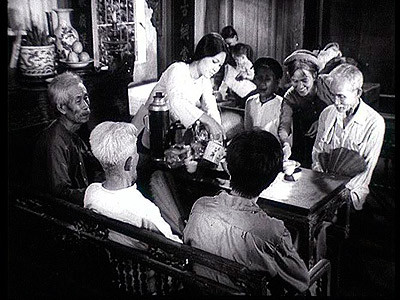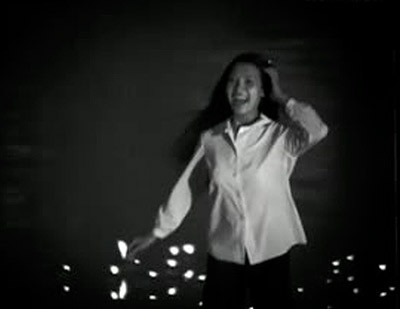The film is full of Vietnamese countryside colors.
(Baonghean) -The film title “When will October come” recalls the lyrics of an old folk song about the joy and hope of farmers waiting for the October harvest. The heavy rice grains in their hands have gone through many storms, saltiness and sacrifices to have a golden harvest. Besides the sacrifices and bravery easily seen on the front lines when facing the enemy, there are also the hidden and noble sacrifices of the hearts of the rear, the wives and mothers, seemingly very small but are the strong and profound vitality that creates victory. That is what the scriptwriter and director Dang Nhat Minh wants to convey in his work.
There are no great events, thrilling details and fierce conflicts. The film tells a simple and touching story: Duyen receives the news that her beloved husband Nam has sacrificed himself on the front line. Suppressing her own pain, she quietly hides the news from her family and neighbors, mainly because her old father-in-law is seriously ill and partly because there is still a little bit of fragile hope, flickering somewhere inside her. But by chance, teacher Khang who teaches at the village school also knows the story, touched by Duyen's noble heart and silent sacrifice, teacher Khang participates in Duyen's work, even becoming the "author" of the letters sent back from the unit.
Misunderstood, Khang had to transfer to another school. The unit sent someone to report Nam's sacrifice while his old father was dying... The plot is simple, the scenery in the film is also very rustic and simple. The ferry with the river, the banyan tree with the communal house roof, the small village by the river and the night of rowing "Truong Vien", a simple thatched roof, a field, a village school, the dike with a kite full of wind... are the director's profound thoughts and subtle, tender emotions about Duyen's silent sacrifice, contributing to enhancing the sublime beauty in the soul of Vietnamese women. The love between Duyen and Nam is portrayed by the author in a meaningful and pure way. The film raises the question of thinking about the responsibility of the living towards the one who has died for this land. On the other hand, the living should love each other, be more responsible for each other because of the one who has died. That is why the ideal of beauty in the film has a lasting social reality and profound morality.

Scene from the movie "When Will October Come?"
The success of the film “When will October come” through the system of characters is vividly and fairly evenly expressed. In particular, the image of Duyen (played by Le Van), the main character of the film, has the power to attract and conquer the audience by its true value of a person, a situation, a real fate in life. The character's personality is moved in the direction of continuity and development. Duyen is innocent and pure in her youthful love, but calm and thoughtful towards her family when she receives news of her husband's death, sincere and full of hope for the future when taking her children to school, the red flag fluttering in the October fields full of seeds...
These developments are consistent with the logic of life and psychology. The inner world of the character is carefully exploited from many different angles: actions, acting, relationships, memories... including dreams and hallucinations that have made the character achieve depth. Duyen has both the common but very typical features of Vietnamese women: loving husband, loving children, being faithful, affectionate... and a very unique face of life, which cannot be confused. With Le Van's natural acting talent and ability to express her inner self, Duyen has won a worthy and excellent position in Vietnamese cinema.
The film has a tight structure, both focused and harmonious between people and natural scenery, between daily life and psychology, between daily reality and poetic romance... The memories, dreams and illusions used in accordance with the laws of life and psychology have brought about the positive aesthetic effect of the work. That is the illusion of "Thanh Hoang", an image with symbolic meaning for the tradition of fighting to save the country of our ancestors, of our homeland and villages, a message from history to today's generation. The dream of reunion under the "yin-yang market" is in some aspects a pure dream of couple happiness, a song about immortal love.

Famous scene about the yin and yang market.
Director Dang Nhat Minh once confided that he wanted to achieve something truly national, truly Vietnamese through the film. His wish came true from the place where the story took place, a familiar village, attached for generations to the idyllic and poetic natural scenery, from the people one would encounter every day, simple, hard-working, and full of neighborly affection. From the discreet souls, quietly sacrificing, full of compassion... all are very imbued with the color and flavor of Vietnam. It can be said that the national character has become the main "character" of "When will the tenth month come", throughout and dissolved in the film in all aspects from the theme, ideological theme, to the plot structure, image and acting of the actors.
“When will October come” is an attractive feature film, imbued with national cultural identity, worthy of the prestigious awards it has been awarded: Golden Lotus at the 1989 Vietnam Film Festival; Special Prize of the Jury of the 1987 Hawaii International Film Festival and recently voted by the American television channel (CNN) as one of the 18 best Asian films of all time. Along with the films: “Chung mot dong song”; “Canh dong hoang”; “Vi tuyen 17, ngay va dem”…, it has become a classic film of Vietnamese cinema.
Le Lan (47, Dang Thuc Hua, Vinh)
